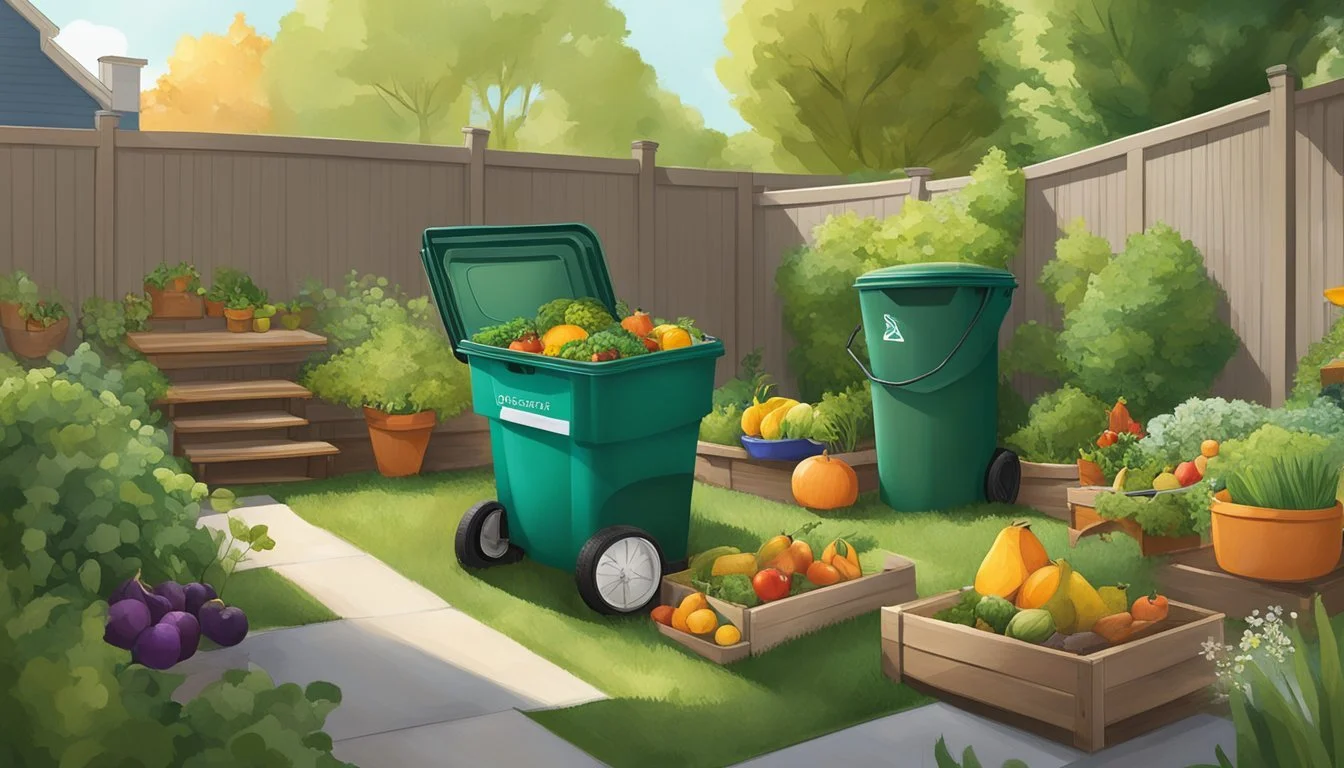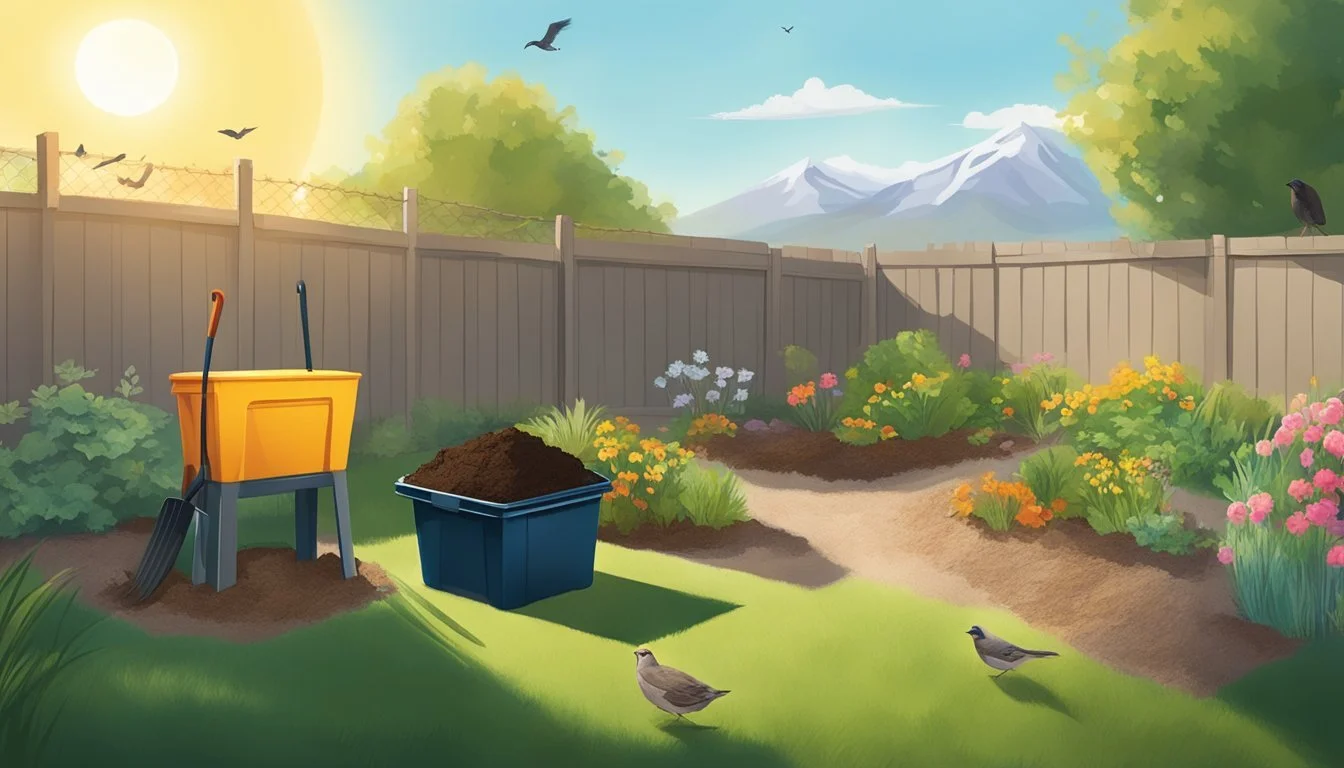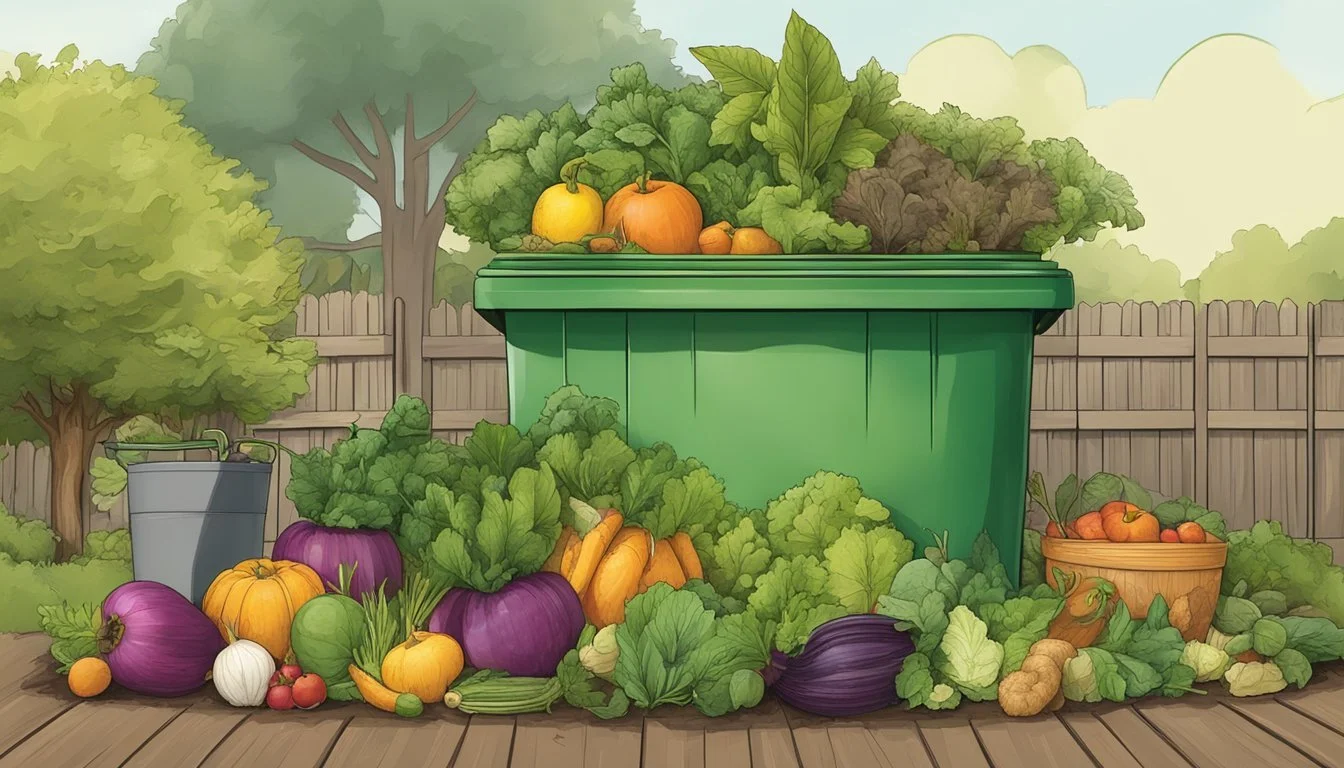Guide to Composting in Provo, UT
Essential Tips for a Greener Tomorrow
Composting in Provo, UT is a practical and environmentally friendly approach to managing organic waste. As individuals become more environmentally conscious, the practice of composting has gained traction as an effective way to enrich garden soil while reducing the amount of waste sent to landfills. Composting transforms organic materials like leaves, fruit scraps, and green wood into a nutrient-rich soil amendment through a natural decomposition process.
Residents of Provo have access to several options for composting, which cater to both seasoned gardeners and those new to the process. The Compost Yard managed by the City of Provo is open seasonally and provides both a drop-off location for green waste and a source for residents to purchase organic compost for their yards and gardens. Backyard composting is another favored method, which further instills a sense of self-sufficiency and contributes to a healthier, more fertile garden soil.
Understanding the basics of composting, such as selecting the right balance of green and brown materials and maintaining the pile, is essential for successful composting in Provo. Education on these techniques is abundantly available, including resources like USU Extension's guide to backyard composting in Utah, which provides valuable insights into creating and sustaining an efficient composting system. These practices enable residents to effectively turn their organic waste into a resource that benefits both their own gardens and the broader Provo ecosystem.
Understanding Composting Basics
In Provo, Utah, mastering composting begins with grasping its fundamentals and recognizing its environmental contributions. Composting is a strategic process converting organic material into a valuable addition for gardens and landscapes.
What Is Composting?
Composting is the controlled natural decomposition of organic material such as leaves, grass clippings, and kitchen scraps. This process transforms waste into nutrient-rich soil or compost, which is an excellent conditioner for all types of soil. It involves a balance of carbon (browns - dry leaves, branches) and nitrogen (greens - vegetable scraps, coffee grounds), where microorganisms break down the material to decompose it effectively.
Benefits of Composting
Provo residents can enjoy multiple benefits from composting:
Improves Soil Health: Compost enriches the soil, helping to produce healthy plants by improving soil structure, texture, and aeration.
Reduces Waste: By composting, households can significantly reduce the amount of waste sent to landfills.
Enhances Fertility: The nutrient-rich compost acts as a natural fertilizer, releasing essential nutrients like nitrogen, potassium, and phosphorus into the soil.
Supports Local Ecosystems: Compost contributes to sustaining local ecosystems by improving soil that supports plant life and, by extension, wildlife.
Setting Up Your Compost System
Creating a compost system in Provo, UT, involves careful selection of compost bins and identifying the best location for them, ensuring adequate sunlight, drainage, and convenience for adding materials and maintenance.
Selecting a Compost Bin
Selecting the right compost bin is the first step. Options range from ready-made bins purchased at garden centers to homemade solutions. Bins typically vary in diameter and length, suitable for different yard sizes. When choosing a bin, one should consider how much compostable material they will generate. A bin that is too small will quickly overflow, while too large a bin might not heat up effectively. Bins should allow for easy addition of carbon-rich material (like leaves and branches) and nitrogen-rich materials (such as food scraps and lawn clippings), as well as the occasional stirring to mix and aerate the pile.
Choosing the Right Location
The location of the compost bin can greatly affect its efficiency. One should choose an area that receives at least six hours of sunlight a day to help heat the compost and assist in the breakdown process. The site should also have good drainage to prevent waterlogging, which can slow down the composting process and lead to odors. Proximity to a water source is convenient for maintaining moisture levels, and it's best to situate the bin close to the yard and kitchen to make adding scraps and yard waste easier. The location should not detract from the landscape or be too close to living areas to avoid any potential odor or pest issues.
Composting Materials
In Provo, UT, successful composting requires knowing what materials are suitable and which should be avoided. Correct selection of composting materials ensures a beneficial and environmentally sound process.
Acceptable Green Waste
One can enrich their compost with a variety of organic materials. This includes:
Grass clippings: They decompose quickly, adding nitrogen to the compost.
Vegetable scraps: All non-meat kitchen scraps can safely go into the compost pile.
Coffee grounds: A source of nitrogen, these also help in maintaining the compost pile's moisture level.
Weeds: Only those that have not gone to seed, so as to prevent spreading in the garden.
Manure: Preferably from herbivores such as cows or horses, as it's rich in nutrients.
For more specifics on organic compost availability and cost for residents and nonresidents, the City of Provo offers detailed information.
Unacceptable Composting Materials
Composting is not a one-size-fits-all solution, particularly when it comes to these materials:
Meat scraps: They can attract pests and cause odor problems.
Dairy products: Similar to meat, they can attract unwanted pests and create a smell.
Bones: They do not break down well and can attract animals to the compost pile.
For guidance on other unusable items in your compost, consult resources like the Utah State University Extension which provides comprehensive details on using compost in gardens.
Composting Techniques
Effective composting techniques in Provo, UT, involve precise layering and maintaining optimal conditions for decomposition. These processes turn green waste and brown materials into nutrient-rich compost beneficial for gardens and landscapes.
Layering Your Compost
Layering is a fundamental practice in building a compost pile. One should alternate layers of green waste, such as kitchen scraps and yard trimmings, with brown materials, including dry leaves, cardboard, and straw. A balanced ratio promotes effective composting—typically, a 1:3 mixture of greens to browns is recommended. Greens provide nitrogen, while browns supply carbon, both crucial elements for decomposition.
Green Layers: Nitrogen-rich materials like vegetables, fruit scraps, coffee grounds.
Brown Layers: Carbon-rich materials like dead leaves, twigs, paper.
Maintaining the Right Conditions
For a compost pile to transform into beneficial compost, maintaining the right temperature, water, and air flow is crucial. The pile should remain moist but not soggy, with water added as needed to keep it damp. Adequate aeration is achieved by turning the pile regularly, ensuring air circulates to all parts, which also helps to evenly distribute heat—critical for breaking down materials and eliminating unwanted weed seeds.
Temperature: A healthy compost pile will generate heat, ideally between 135-160°F (57-71°C).
Moisture: The pile should feel like a wrung-out sponge; this level of water content supports the microbes that break down organic matter.
Aeration: Regular turning introduces air, which is essential for aerobic decomposition and heat production.
Troubleshooting Common Composting Issues
When managing a compost pile in Provo, UT, it is important to navigate common issues like odors and pests effectively. Balance in carbon and nitrogen, proper aeration, and moisture levels are crucial for maintaining a healthy compost.
Odor Problems
Cause: Unpleasant smells usually indicate an imbalance in the compost's carbon-to-nitrogen ratio (C/N ratio), with too much nitrogen-rich green material like food scraps or garden waste. Other causes may be insufficient air or too much water making the compost pile anaerobic.
Solution: To remedy this, add carbon-rich materials such as dry leaves, straw, or shredded paper to absorb excess moisture and nitrogen. Turning the pile regularly will incorporate air and distribute moisture and carbon materials evenly throughout the compost, aiding in the breakdown process and eliminating odors. Make sure the compost pile is not too wet; if it is, add more dry, carbon-rich material to soak up excess moisture.
Pest Attraction
Cause: A compost pile might attract rodents and insects if it contains meat, dairy, or oily foods, which should not be added.
Solution: To deter pests, ensure only appropriate materials are added—vegetable scraps, coffee grounds, eggshells, and similar items. Keep the compost covered with a layer of carbon-rich material like leaves or straw. Also, turning the pile regularly and maintaining a balance between green and brown materials helps make the environment less appealing to pests by burying food scraps and accelerating decomposition.
Provo-Specific Composting Guidance
The residents of Provo, UT, benefit from dedicated composting services provided by the city, offering a structured approach to managing organic waste through the Provo Compost Yard and supporting city regulations.
Compost Yard Services
Provo's Compost Yard is a hub for organic waste recycling where residents can buy high-quality compost. The facility caters to Provo residents and commercial haulers, such as landscapers, with different rates based on residency status. Residents are encouraged to use the available service from March to November on Fridays and Saturdays, weather permitting. They can purchase compost at $5 per yard with proof of residency, for example, a Provo City utility bill. Nonresidents are charged $10 per yard. The size of the vehicle, from a pickup truck to a trailer, doesn't restrict access, but rates may vary.
Operating Hours: Fridays and Saturdays, 7 AM – 5 PM (March - November)
Cost:
Provo Residents: $5 per yard
Nonresidents: $10 per yard
Location: 1625 S Industrial Pkwy, Provo, UT
Accepted Waste: Green waste, yard waste
City Regulations and Support
The Provo city has established a set of regulations to streamline the composting process. Waste collection includes garbage, green yard waste, and recycling. The Sanitation Division oversees the pickup schedules, offering consistent service throughout the community. It is essential that cans are placed outside the night before the scheduled pickup to ensure collection. The city provides a Sanitation Schedule Map for residents to verify their service days. To assist the process, Provo's composting infrastructure is approved and regulated, assuring Provo residents that their waste is handled responsibly and sustainably.
Collection Schedule: Align with the Sanitation Schedule Map
Cans Placement: The night before the service day
Sanitation Division Oversight: Ensures proper waste management
Through these services and regulations, the city of Provo promotes environmental stewardship and provides residents with an efficient system to manage and recycle organic waste.
Utilizing Finished Compost
Finished compost, sometimes referred to as 'black gold', is an important soil amendment for Provo gardens and community initiatives. This nutrient-rich material can vastly improve soil structure and provide essential nutrients to plant roots.
In Your Garden and Landscaping
In personal gardens, applying compost can enhance soil fertility and tilth, offering a host of benefits for flowering plants and vegetable plots. Here is a straightforward way to integrate compost into a garden setup:
For New Plantings: Mix approximately 2-3 inches of compost into the top 6 inches of soil before planting.
For Established Gardens: Apply a 1-inch layer of compost as a mulch to provide nutrients and suppress weeds without disturbing plant roots.
On lawns, a light dressing of compost can act as a natural fertilizer, improving grass vigor and health.
For Community and Education
Community gardens in Provo can benefit from compost by using it to prepare new beds and enhance existing ones. Schools and educational programs can also use compost as a hands-on teaching tool to demonstrate:
Soil Science: Discussing how compost contributes to soil structure and fertility.
Sustainability: Illustrating the value of recycling organic waste into a resource that enriches community gardens.
In summary, finished compost is an invaluable resource for both personal gardens and community efforts in Provo, influencing everything from the ground up to foster rich soil and robust plant growth.
Additional Resources and Information
In Provo, UT, residents have access to robust resources for mastering the art of composting. The local community offers a variety of educational opportunities and engages experienced composting advocates to enhance sustainable practices.
Workshops and Tutorials
For those new to composting, the City of Provo frequently organizes workshops and tutorials. These sessions are designed to teach individuals how to set up and maintain a composting system at home, tailoring advice to the specific climate and conditions of Provo. These educational events focus on various composting methods suitable for small apartment gardens to larger community green spaces.
Local Composting Advocates
Community-led initiatives play a pivotal role in Provo's composting scene. Local composting advocates can be found through the City's sustainability programs, where seasoned composters share their knowledge and passion. They help educate citizens on the numerous benefits of composting, such as soil fertility and waste reduction, while fostering a sense of community and environmental responsibility.
Conclusion
In Provo, UT, embracing composting is a straightforward route to managing yard waste efficiently and contributing to recycling efforts. Residents are empowered to transform organic waste into compost that can revitalize gardens and reduce the load on local landfills.
The City of Provo promotes composting as both an individual and community practice. Through facilities like the Compost Yard, citizens have access to services that encourage the recycling of organic materials. In particular:
March to November Operation: Residents can take advantage of the Compost Yard during the active gardening months, ensuring regular diversion of organic waste.
Glass Recycling Accessibility: The establishment of a dedicated area for glass recycling helps in maintaining a sustainable urban environment.
Residents interested in backyard composting can capitalize on guidance from Utah State University Extension to create effective organic compost setups. They can learn about the benefits of compost, such as its soil amendment qualities and modest fertilizer value.
The Sustainability and Natural Resources Committee in Provo champions the judicious use of resources, which includes supporting community composting initiatives.
Provo's commitment to recycling and waste management reflects an understanding that sustainability is critical. The city's efforts to support recycling and composting activities reveal its dedication to environmental stewardship and the promotion of a greener community.
Appendix
This section serves as a resource guide for residents looking to participate in local composting initiatives. It includes information on facilities and events within Provo, UT.
Local Composting Facilities
Provo Compost Yard
Availability: Open March through November
Days: Fridays and Saturdays
Hours: 7:00 AM to 5:00 PM
Rates: $5 per yard for residents, $10 per yard for nonresidents
Residents must provide either a driver's license or a current Provo City utility bill for drop-off.
Learn more about the Provo Compost Yard
Composting Events Calendar
Seasonal Cleanups
Availability: During Spring and Fall seasons
Cost: Free participation for residents
Special hours are offered to accommodate increased volume during these events.
View recycling and composting event schedule










